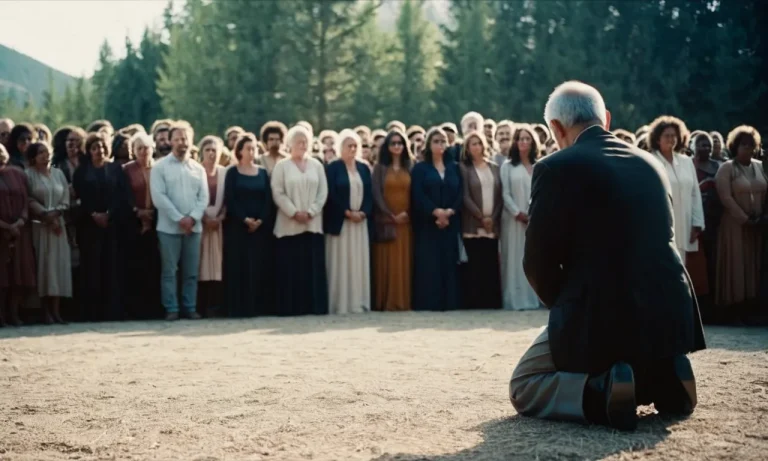God Meets Us Where We Are
We all go through difficult times in life when we feel lost, alone, or questioning our faith. In those dark moments, it can seem like God is far away or has abandoned us. However, the Bible shows time and again that no matter how far we wander, God always meets us where we are in order to bring us back into relationship with Him.
If you’re short on time, here’s the key point: Even when we feel distant from God because of sin or circumstances, He actively seeks us out to restore us with His redeeming love and grace.
In this article, we’ll explore how God meets us in the messiness of life to extend His compassion. We’ll look at biblical stories that demonstrate God’s patience in finding people where they are, not where they should be.
And we’ll discuss what it means for our daily walk with Christ to trust that He meets us wherever we are – whether in seasons of obedience or disobedience.
The God Who Seeks
The Lost Sheep and Coin
In Luke 15, Jesus tells two parables that illustrate God’s heart for the lost. The first is about a shepherd who leaves his 99 sheep to search for one that is lost. The shepherd rejoices when he finds it. The second parable tells of a woman who loses one of her ten silver coins.
She turns the house upside down until she finds it, then calls her friends and neighbors to rejoice with her.
These parables reveal some amazing truths about God’s character. First, He notices when even one person is missing from His flock. Every individual matters to Him. Second, He takes the initiative to seek out those who are lost.
God does not sit back and wait for people to come to Him; He actively pursues them. Third, He rejoices when the lost are found. There is celebration in heaven over one sinner who repents (Luke 15:7).
The takeaway is that God cares deeply for each person He created and longs to have a relationship with them. He does not give up when someone wanders from the flock but tirelessly seeks after them. When they return, He welcomes them with open arms of grace and mercy.
The Prodigal Son
In Luke 15:11-32, Jesus tells another parable commonly known as the Prodigal Son. A father has two sons. The younger son demands his inheritance early, then leaves home and wastes it all through reckless living.
Finally destitute, he decides to return home, hoping his father will take him back as a servant. But as he approaches, the father sees him, has compassion, runs to embrace him, and welcomes him joyfully.
This parable further emphasizes God’s eagerness to receive those who have strayed but choose to return to Him. The son represents sinners who leave God’s side through disobedience and self-indulgence. The father represents God, who patiently and expectantly waits for their homecoming.
He does not lecture or punish them, but loves and forgives them freely (Luke 15:20-24).
Through these parables, Jesus corrects the notion that God is aloof or uncaring about the lost. Quite the opposite – He ardently seeks after them and celebrates their return. As the shepherd, woman, and father rejoice, so does God rejoice when sinners repent and enter His kingdom.
Meeting Us in Our Sin
David and Bathsheba
The story of David and Bathsheba in 2 Samuel 11-12 demonstrates God’s grace and forgiveness even in the midst of terrible sin. King David committed adultery with Bathsheba and then conspired to have her husband Uriah killed in battle to cover up the pregnancy.
The prophet Nathan confronted David about his sin, and David repented. As a result, God forgave David but there were still consequences – the child conceived with Bathsheba died. Though David’s sin was grievous, God’s mercy was greater.
As Psalm 51 shows, David threw himself upon God’s abundant mercy and grace for forgiveness. God is willing to forgive any sinner who repents, no matter how awful the sin.
The Woman Caught in Adultery
In John 8:1-11, the Pharisees brought a woman caught in adultery before Jesus and challenged Him to condemn her according to the Law of Moses. But Jesus responded with grace, saying “Let any one of you who is without sin be the first to throw a stone at her” (John 8:7).
When the accusers left one by one, Jesus declined to condemn her and told her to “go now and leave your life of sin” (John 8:11). This story illustrates that while God despises sin, He comes to meet us with mercy in the midst of our failures.
As 1 John 1:9 says, “If we confess our sins, he is faithful and just to forgive us our sins and to cleanse us from all unrighteousness.” God does not approve of sinful lifestyles, but He will forgive any who acknowledge their need and turn to Him.
Meeting Us in Our Doubt
Thomas
Thomas, one of Jesus’s twelve disciples, is well known for his initial doubt of Jesus’s resurrection. When the other disciples told Thomas that they had seen the risen Christ, he responded, “Unless I see the nail marks in his hands and put my finger where the nails were, and put my hand into his side, I will not believe” (John 20:25).
Jesus later appeared to Thomas and invited him to touch his wounds. Upon seeing Jesus face-to-face, Thomas’s doubt vanished and he proclaimed, “My Lord and my God!” (John 20:28). This story illustrates how Jesus graciously meets us in the midst of our questions and uncertainties, revealing himself to those who seek him.
Peter’s Denial
Peter’s famous denial of knowing Christ occured on the night that Jesus was betrayed and arrested. Although Peter vowed to stick by Jesus no matter what, when accusations arose, fear overtook him and he denied Jesus three times (Mark 14:66-72).
We can imagine Peter felt deep shame and disappointment in himself. Yet remarkably, following the resurrection, Jesus restored Peter with love and recommissioned him (John 21:15-19). Despite failures, Jesus draws near to meet us with forgiveness and second chances.
Like Peter, we can receive grace to move forward in faith.
Practical Implications
God Understands Our Weakness
As humans, we all have moments of weakness and failure. Life can be difficult, and sometimes we lose our way. In those times, it’s comforting to know that God understands our struggles. He knows we are imperfect beings, and His grace covers our shortcomings (Hebrews 4:15).
When we mess up, God doesn’t reject us or shame us. He picks us up, dusts us off, and helps us start again. God cares more about the direction of our hearts than our stumbles along the way. He can use even our mistakes and failures for good if we let Him (Romans 8:28).
So when you feel weak, don’t despair. Look to God, admit your struggles openly and honestly, and let Him renew your strength (Isaiah 40:31).
There is Grace for the Journey
Following Jesus is a lifelong journey full of ups and downs. There will be mountaintop experiences of joy and transcendence. But there will also be valleys of doubt, failure, and pain. Through it all, God promises His grace is sufficient for the journey (2 Corinthians 12:9).
By grace, He equips and sustains us each step of the way. When things are going well, His grace keeps us humble and thankful. When trials come, His grace gives us strength to press on. And when we stumble, His grace picks us back up again. God knows the road ahead is long and challenging.
But we can be confident that His grace will supply all we need to finish the race (Philippians 1:6). Our part is simply to trust Him fully and walk in His ways each day.
Restoring Our First Love
It’s easy for passion and devotion to fade in long-term relationships, even our relationship with God. We can gradually drift away from our first love for Him over time. The obligations of life, the draw of other interests, and the weight of unconfessed sin can chip away at our loyalty bit by bit.
Soon activities that once filled us with joy, like worship and prayer, can become dry duties. How do we restore the fire of our devotion? Jesus’ advice to the church at Ephesus was simple: Remember, repent, and return (Revelation 2:4-5).
Remember the height from which you have fallen in your love and passion for God. Repent, asking God’s forgiveness for the drifting and complacency. And return to the things you did at first – reading Scripture, enjoying God’s presence in quietness, serving Him wholeheartedly.
As we refocus our hearts on Him, God promises to run and meet us, restoring the joy of our salvation (Luke 15:20).
Conclusion
No matter how far we wander – into sin, shame, questions, or confusion – God always meets us where we are. He actively seeks after the lost, extending compassion to brokenness and patience to doubt. As we walk with Christ, we can trust His grace to meet us in our current place and lead us to restoration.
Rather than hiding from God or trying to clean ourselves up on our own, we simply come to Him as we are. His love washes over us, transforming shame into worthiness and doubt into deeper belief. He exchanges our weakness for His strength when we surrender our failures and fears.
Without condemnation for the past, He invites us into a hopeful future – one where we experience the fulfilling relationship with God we were created for.








